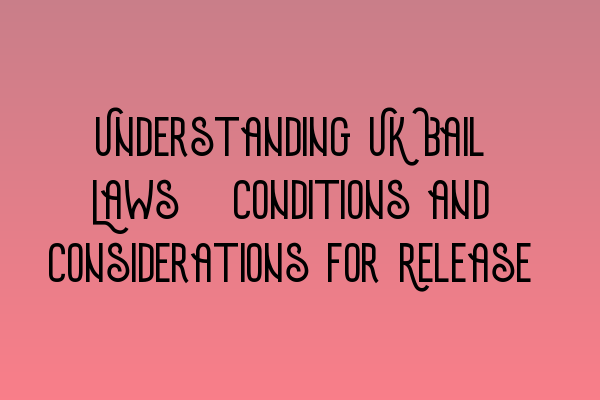Understanding UK Bail Laws: Conditions and Considerations for Release
In the criminal justice system, bail serves as a mechanism for releasing individuals accused of committing a crime from custody while awaiting trial. It allows individuals to be granted temporary freedom, with certain conditions and considerations to ensure their appearance in court and prevent any potential risks to the public or the criminal justice process. This blog post aims to provide a comprehensive understanding of UK bail laws, including the key conditions and considerations for release.
1. The Purpose of Bail
Bail plays a crucial role in the criminal justice system by balancing the rights of the accused and the interests of the public. Its primary purpose is to ensure that individuals are not being detained unnecessarily and to uphold the presumption of innocence until proven guilty. Nonetheless, the grant of bail is not automatic and is subject to various factors considered by the court.
2. Bail Conditions
When granting bail, the court may impose certain conditions that must be adhered to by the individual released. These conditions are set to minimize the risk of flight, prevent interference with witnesses, protect the safety of others, and maintain public confidence in the criminal justice system. Some common bail conditions include:
a. Attendance: The accused may be required to attend court for scheduled hearings and trial.
b. Residency: The court may establish a specific address where the accused must reside during the period of bail.
c. Reporting: Regular reporting to a police station or other designated authority may be mandated.
d. Curfew: A specific time frame during which the accused must stay at a designated location can be imposed.
e. Non-contact order: Prohibition from contacting certain individuals, especially victims or witnesses, can be imposed.
f. Surrendering travel documents: The court may require the accused to surrender passports or other travel documents to prevent them from leaving the country.
g. Surety: Bail may be granted on the condition of a financial guarantee, known as a surety, provided by a third party.
The specific conditions imposed vary on a case-by-case basis, taking into account the seriousness of the offense and the individual’s personal circumstances.
3. Considerations for Bail
In determining whether to grant bail, the court considers several factors to ensure the proper administration of justice. These factors include:
a. Nature and seriousness of the offense: The court assesses the gravity of the charge and the potential penalties to determine the risk of absconding.
b. Criminal record: Previous convictions or breaches of bail conditions can be significant considerations when determining the risk of re-offending or non-compliance.
c. Community ties: The court considers the accused’s connections to the community, such as family, employment, and stability, as indicators of their commitment to remain available for trial.
d. Flight risk: The likelihood of the accused absconding during the pre-trial period is a critical consideration in the bail decision-making process.
e. Risk of interference: The court assesses the potential for the accused to interfere with witnesses, intimidate others, or obstruct the administration of justice.
f. Safety of the public: Public safety is paramount, and the court balances the rights of the accused with the protection of the community.
4. Expert Legal Assistance
Understanding the intricacies of UK bail laws can be complex, and it is crucial to seek expert legal assistance when navigating the criminal justice system. At SQE Criminal Law & Practice Law UK, our team of experienced solicitors is dedicated to providing comprehensive legal guidance and representation.
We offer SQE 1 Practice Exam Questions and SQE 1 Practice Mocks FLK1 FLK2 to help you prepare for your exams. Our SQE 2 Preparation Courses and SQE 1 Preparation Courses are designed to equip aspiring solicitors with the necessary knowledge and skills to excel in their careers. Don’t forget to check out the SRA SQE Exam Dates to stay updated with important deadlines.
If you or your loved one is facing criminal charges and require assistance with bail applications or any other aspect of criminal law, contact our team at SQE Criminal Law & Practice Law UK. We are committed to ensuring the best possible outcome for your case while upholding your rights under UK bail laws.
In conclusion, UK bail laws play a crucial role in the criminal justice system by allowing individuals to be released from custody pending trial. The conditions and considerations for bail are carefully set to balance the rights of the accused and the interests of the public. Understanding these laws is essential to ensure a fair and just legal process. Seek expert legal assistance for comprehensive guidance and representation throughout your case.
[Photo credit: Example.com]
